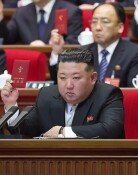Korea should never kneel down to China’s retaliation for THAAD
Korea should never kneel down to China’s retaliation for THAAD
Posted March. 04, 2017 06:57,
Updated March. 04, 2017 07:17
The China National Tourism Administration, which oversees the country’s tourism industry, is reportedly expanding its ban on sale of Korea tour products from Beijing to across the country. After Lotte confirmed its decision to provide the South Korean Defense Ministry with Seongju Country Club in North Gyeongsang Province as the site for the terminal high altitude area defense (THAAD) system, the Chinese government is spearheading retaliatory measures against South Korea through verbal order, which leaves no evidence. With Chinese media even mentioning the possible semi-closure of bilateral diplomatic ties and argument for military strike at Seongju, if China further spreads its cowardly retaliatory measures including anti-South Korean protests and a boycott of South Korean goods, the significance of the Seoul-Beijing ties that will mark the 25th anniversary in August this year will also suffer a setback.
The U.S. State Department strongly blasted China’s excessive measures, saying that “Pressuring South Korea to give up its self-defense is irrational and inappropriate.” When South Korea and the U.S. announced their joint decision to deploy the THAAD missile defense system in July last year, they proclaimed that the decision was made as part of the South Korea-U.S. alliance. As such, Washington’s proactive response is appropriate in its capacity as an ally. China, which does not even mention retaliation against the U.S., is only threatening South Korea apparently in a bid to weaken the Seoul-Washington alliance and dampen Seoul-Washington-Tokyo’s joint efforts to keep Beijing in check. However, the fact China is blaming South Korea for the latter’s THAAD deployment even when Pyongyang is openly threatening to launch preemptive strike against South Korea with nuclear weapons is nonsense and absolutely ridiculous at best.
North Korea has constantly posed threat to peace on the Korean Peninsula through a string of provocations and terror attacks including nuclear tests, firing of ballistic missiles, sinking of the South Korean naval corvette Cheonan with a torpedo attack, artillery attacks on Yeonpyeong Islands and the recent assassination of Kim Jong Nam, but Beijing has only grudgingly behaved as if it is joining UN sanctions against the North. Pressuring South Korea while leaving the perpetrator intact reflects Beijing’s intention that it will never dump Pyongyang no matter what its Communist neighbor does. South Korean President Park Geun-hye, who visited China and stood on the Tiananmen Fortress in Beijing despite Washington’s opposition in September 2015, was effectively cheated by Chinese President Xi Jinping. Seoul should recognize the reality that no matter how much progress has been made in Seoul-Beijing economic relations, South Korea’s ties with China as "partners of strategic cooperation" can never replace the Seoul-Washington alliance.
China’s pressure on South Korea would have been partly affected by the South Korean opposition parties’ demand to hand over the THAAD issue to the next administration. China, which remembers deterioration of ties between Seoul and Washington during the Roh Moo-hyun administration, may expect that if the main opposition Minjoo Party’s former Chairman Moon Jae-in becomes the next president, Seoul may revoke THAAD deployment. Beijing may also be referring to the "lessons" it learned in 2000, when South Korea increased its tariff on Chinese garlic by more than 10 folds only to hurriedly withdraw the measure after Beijing excessively retaliated by suspending import of South Korean mobile handsets.
Japan suffered massive damage due to China's far-flung retaliations during territorial dispute over the Senkaku Islands in 2012, but decisively and sternly reacted nonetheless. Tokyo strengthened its ties with Washington and beefed up its military capability in order to keep China in check. If South Korea kneels down over the THAAD issue that can determine this nation’s fate and survivability due to economic burden this time, China will consider South Korea its colony as in the long past. The South Korea-U.S. alliance, which has been buttressing the Republic of Korea’s survival and prosperity, will also inevitably face a serious crack. The Republic of Korea should form a united front by overcoming political factions and ideologies, and robustly and confidently stand up against Beijing’s unjust pressure.
The first summit between U.S. President Donald Trump and Chinese President Xi Jinping, which is expected in April, is an opportunity to change Beijing. President Trump should tell Xi in person that the THAAD system is not an issue that Beijing needs to be concerned about. President Xi himself is also advised to seek to find an effective solution to the North Korean nuclear issue, rather than only finding fault with THAAD going forward. It is ill-advised for China to believe it can sway the Seoul-Washington alliance by exploiting the power of money. If China tries to test South Korea over the THAAD issue, Beijing will also end up paying hefty price as well.







